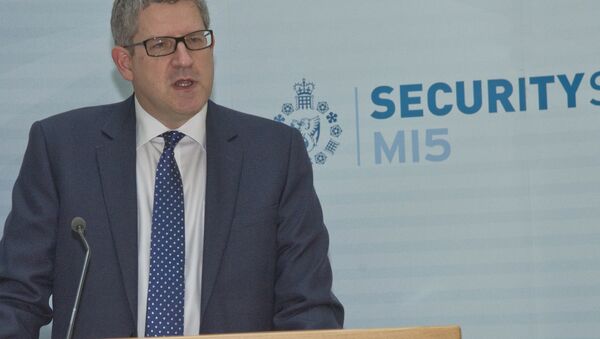Andrew Parker was giving the first ever live radio interview by an incumbent head of MI5 since it was formed in 1909. It is being seen as a sign of greater transparency, following the revelations by ex-CIA contractor Edward Snowden that the UK's intelligence service were co-operating with the US National Security Agency (NSA) in mass surveillance.
"first public drumbeat of a carefully choreographed campaign by the govt to revive its snooper’s charter legislation" @alantravis40 #MI5
— CAGE (@UK_CAGE) September 17, 2015
There was outrage when Snowden revealed in 2013 that the NSA was tapping internet data globally under a program called PRISM and that the UK's surveillance agency, GCHQ, had access to it under a program called Project Tempora, both of which involved extensive mass data-mining of Internet and telecom systems.
— Sean O'Neill (@TimesONeill) September 17, 2015
Andrew Parker's unprecedented appearance on @BBCr4today is a sign of how important MI5 believes it is to update communications data powers
— Danny Shaw (@DannyShawBBC) September 17, 2015
The outrage led to the heads of the three UK intelligence services MI5, MI6 and GCHQ being hauled before parliament to explain themselves and finally, to an independent review by David Anderson QC that concluded that Britain's surveillance laws were:
"Undemocratic, unnecessary and — in the long run — intolerable."
Parker told the Today radio program on the BBC that the threat of terrorism in the UK was already officially classified as 'Severe' and that the country was even more at risk because of the crisis in the Middle East.
"Because of that threat we face, the way the terrorists operate and the way the we all live our lives today, it's necessary that — if are to find and stop the people who mean us harm — MI5 and others need to be able to navigate the internet to find terrorist communication."
"We need to be able to use data sets so we can join the dots so we can find and stop the terrorists who mean us harm before they are able to bring plots to fruition," he said.
In recent years, he said the intelligence services and the police had been "pretty successful" in recent years but that it was becoming more and more difficult as technology changes faster and faster.
Snoopers' Charter Back on Agenda
David Cameron's government is set to introduce the Investigatory Powers Bill that will pave the way for legislation to give police and the security services far more wide-ranging capabilities. Also known as the Snoopers' Charter, the law would allow for the tracking of everyone's web and social media use, but would also strengthen the security services' powers for the bulk interception of the content of communications.
Andrew Parker: "the terror threat is growing". MI5 needs your help monitoring citizens. http://t.co/JaUfQMb14Z pic.twitter.com/ss9ZAXnGWQ
— Scarfolk Council (@Scarfolk) September 17, 2015
However, civil rights groups have said the new law will give the police and intelligence services even more powers to snoop than before. An attempt to put the legislation through under the previous coalition government failed because of opposition from the coalition partners, the Liberal Democrats.
"The really important thing for MI5," said Parker, is that "as people understand, we operate within a framework of law set by parliament and independently overseen.
"As our capabilities move forward, I think it's important that — from time to time — legislation is updated so we are operating under modern, straightforward law that describes transparently and as fully as it can what sort of thing MI5 does these days."
'Ethical Responsibility'
He said MI5 did not have the capability to monitor billions of Internet, social media or telecom chats and that it was focused on a small number of those it believed were plotting terrorism. But he said "it also requires the co-operation of the companies who run and provide services over the Internet that we all use. It's in nobody's interests that terrorists can be able to plot and communicate out of the reach of any authorities with the legal power [to do so]."
Referring to whether social media websites, such as Facebook, should monitor and hand over data on potential criminal activity, he said:
"It goes to the question of the ethical responsibility of the companies for the communications and the data that they hold and the data that they carry."
"And this question comes up in the realm of child sexual exploitation, terrorism, other forms of crime and I think here is a real question about whether companies holding information of that sort should come forward to the authorities and share and report it," he said.




